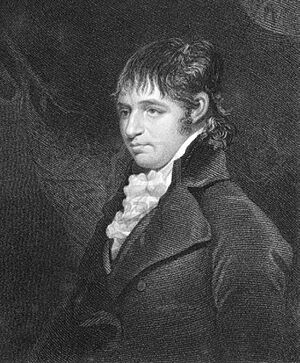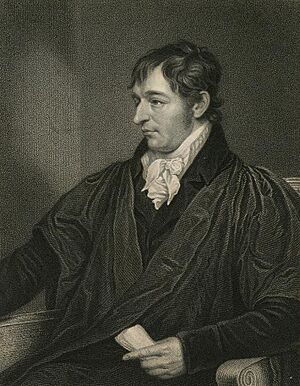Richard Porson facts for kids
Richard Porson (born December 25, 1759 – died September 25, 1808) was a very smart English scholar who studied ancient Greek and Roman texts. He discovered something important in Greek grammar called Porson's Law. Also, a special Greek writing style, or typeface, was created based on his own handwriting!
Contents
Growing Up: Richard Porson's Early Life
Richard Porson was born in a small village called East Ruston in Norfolk, England. He was the oldest son of Huggin Porson, who was the church clerk. His mother came from a nearby village.
Richard first went to school in his village, then to another school in Happisburgh. There, his teachers quickly noticed how amazing his memory was and how good he was at math. His teacher, Mr. Summers, later said that in 50 years of teaching, he had never met boys as clever as Richard and his two brothers!
Mr. Summers taught Richard Latin for three years. Richard's father also helped him learn by making him repeat his lessons every night. Richard could perfectly recall things he had learned a year or two earlier, even if he hadn't seen them since! He didn't have many books at home, just a few on math, a grammar book, and some magazines.
Richard Porson's Education Journey
When Richard was eleven, the local church leader, Mr. Hewitt, started teaching him along with his own children. Richard studied famous Roman writers like Julius Caesar, Terence, Ovid, and Virgil. He was also very good at math.
Mr. Hewitt introduced Richard to John Norris, a kind person who decided to pay for Richard's education in 1773. Richard then went to Eton College, a famous school, in 1774.
Richard wasn't very fond of Eton, but he was popular there. He even wrote two plays for his fellow students! People noticed his incredible memory, but his writing skills needed work, and he had some gaps in his knowledge.
Sadly, his helper John Norris died in 1777. But other people from Eton helped pay for Richard to go to university. A new helper, Sir George Baker, also stepped in. With their help, Richard started at Trinity College, Cambridge, in 1778. He was inspired by other great scholars like Richard Bentley and Richard Dawes.
In 1780, Richard became a scholar at Trinity. In 1781, he won a big university award called the Craven scholarship. He earned his first degree in 1782, finishing as one of the top students. Soon after, he won the first Chancellor's Medal for classical studies. The same year, he became a fellow of Trinity College, which was quite unusual for someone so young. He earned his master's degree in 1785.
Richard Porson's Early Writings
Richard's first published writing appeared in a review in 1783. He wrote about different books, including one on Aristophanes, a famous Greek comedy writer.
The Cambridge university press wanted to make a new edition of a book by Thomas Stanley about Aeschylus, another famous Greek playwright. They asked Richard to edit it, but he refused. He didn't want to use Stanley's text because it had many mistakes. Richard really wanted a special old manuscript from Florence to be checked for the new edition. He even offered to do it himself, but the university leaders said no.
In 1786, Richard helped with a new edition of Xenophon's Anabasis. He wrote short, clear notes in Latin, showing his deep knowledge of Greek writers like Plato and Athenaeus.
The next year, Richard wrote a very important work called Notae breves ad Toupii emendationes in Suidam. This book, published in 1790, made Richard famous as a scholar beyond England. He even received letters from well-known scholars in other countries.
Between 1788 and 1789, Richard wrote letters to Archdeacon Travis about a debated verse in the Bible. A famous historian, Edward Gibbon, said it was "the most acute and accurate piece of criticism" since the time of Bentley. However, Richard's view was not popular then. One of his friends even reduced the money she had left him in her will because she heard he had written a book against the Bible.
Richard also wrote articles for different magazines, reviewing books on history and ancient Greek language.
Losing His Fellowship and New Support
In 1792, Richard's fellowship at Trinity College ended because he chose not to become a priest. The head of the college gave the other available fellowship to his nephew instead. This left Richard without a way to support himself.
However, his friends quickly gathered money to provide him with an income of about £100 a year. Richard accepted the money on the condition that he would receive the interest during his life, and the main amount would be returned to his friends after he died. When he passed away, some of this money was used to create the Porson Prize in 1816 and the Porson Scholarship in 1855 at Cambridge University. These awards still exist today!
Richard mostly lived in London but sometimes visited friends. In 1792, he was elected the Regius Greek Professor at Cambridge. He held this important position until he died. His job involved helping with exams for university scholarships and awards in classical studies.
Richard Porson's Later Work
Richard mainly focused on studying ancient Greek plays (tragedies), the comedies of Aristophanes, the writings of Athenaeus, and old Greek dictionaries (lexicons) like those by Suidas, Hesychius, and Photius. He even copied the Photius dictionary twice by hand!
In 1795, an edition of Aeschylus was published in Glasgow. It didn't have his name on it, but everyone knew it was Richard's work because of the new readings and corrections he added. He also started working on a complete edition of Euripides, another famous Greek playwright, with the first part, Hecuba, appearing in 1797.
Richard Porson's Later Life and Death
In 1806, when the London Institution was started, Richard was made the main librarian. This job gave him a good salary and a place to live, making his last years more comfortable.
Richard was good friends with James Perry, who edited a newspaper called the Morning Chronicle. In 1796, Richard married Perry's sister, Mrs. Lunan. He drank less during this time, but sadly, she died just a few months later in 1797. After her death, he returned to his old habits and his rooms in the Temple. His friendship with Perry led him to write for the Morning Chronicle newspaper.
For several months before he died, Richard seemed to be getting weaker. His memory wasn't as sharp as it used to be. On September 19, 1808, he had a sudden fit in the street. He partly recovered but passed away on September 25. He was buried in Trinity College, Cambridge, near the famous scientist Isaac Newton.
Richard Porson's Legacy
Richard Porson was known for his amazing ability to correct mistakes in ancient texts. He was very careful with his notes. After he died, his library was split up. Trinity College bought one part, which included his notes and letters from other scholars.
His notebooks were very detailed and showed his neat handwriting. Many of his works were published after his death by other scholars who continued his work. For example, James Henry Monk and Charles James Blomfield edited his notes on Athenaeus and Greek poets. Other scholars also edited his notes on Aristophanes and other ancient texts.
 | Bayard Rustin |
 | Jeannette Carter |
 | Jeremiah A. Brown |



